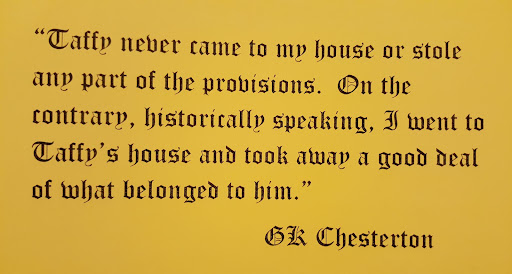It may be said that this institution of the home is the one anarchist institution. That is to say, it is older than law, and stands outside the State. By its nature it is refreshed or corrupted by indefinable forces of custom or kinship. This is not to be understood as meaning that the State has no authority over families; that State authority is invoked and ought to be invoked in many abnormal cases. But in most normal cases of family joys and sorrows, the State has no mode of entry. It is not so much that the law should not interfere, as that the law cannot. Just as there are fields too far off for law, so there are fields too near; as a man may see the North Pole before he sees his own backbone. Small and near matters escape control at least as much as vast and remote ones; and the real pains and pleasures of the family form a strong instance of this. If a baby cries for the moon, the policeman cannot procure the moon -- but neither can he stop the baby. Creatures so close to each other as husband and wife, or a mother and children, have powers of making each other happy or miserable with which no public coercion can deal. If a marriage could be dissolved every morning it would not give back his night's rest to a man kept awake by a curtain lecture; and what is the good of giving a man a lot of power where he only wants a little peace? The child must depend on the most imperfect mother; the mother may be devoted to the most unworthy children; in such relations legal revenges are vain. Even in the abnormal cases where the law may operate, this difficulty is constantly found; as many a bewildered magistrate knows. He has to save children from starvation by taking away their breadwinner. And he often has to break a wife's heart because her husband has already broken her head. The State has no tool delicate enough to deracinate the rooted habits and tangled affections of the family; the two sexes, whether happy or unhappy, are glued together too tightly for us to get the blade of a legal penknife in between them. The man and the woman are one flesh -- yes, even when they are not one spirit. Man is a quadruped.
GK Chesterton, What's Wrong with the World (1910).
40 Days to Give So Others Might Live This Lent
-
We are called Pray, Fast and Give Alms in Lent. This year, the money you
save in Lent could help us to offer women the help they need to keep their
babie...
2 months ago


No comments:
Post a Comment